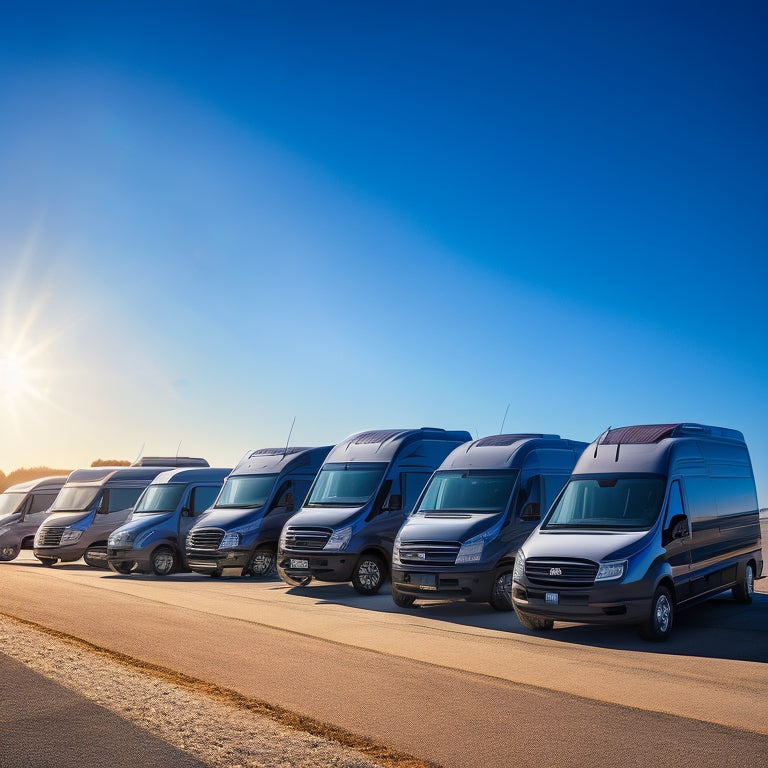
Why Choose Vehicle Solar Panels for Your Fleet?
Share
You can optimize your fleet's performance and reduce costs by incorporating vehicle solar panels into your management strategy. By powering auxiliary systems, solar panels decrease fuel consumption costs and reduce your fleet's reliance on fossil fuels. They also extend battery life cycles, improve uptime efficiency, and enhance vehicle performance capabilities. Additionally, solar panels help meet emissions reduction targets, improve driver safety features, and boost your fleet's sustainability ratings. From simplifying maintenance schedules to reducing environmental impact, the benefits of vehicle solar panels are vast – and you can discover more about how they can transform your fleet's operations.
Key Takeaways
• Reduce fuel consumption costs and emissions by powering auxiliary systems with solar energy.
• Extend battery life and reduce maintenance costs with supplemental solar power.
• Improve fleet uptime efficiency by minimizing downtime and reducing maintenance frequency.
• Enhance driver safety with solar-powered cameras, real-time alerts, and advanced driver-assistance systems.
• Boost fleet sustainability ratings by reducing dependence on fossil fuels and lowering emissions.
Reduce Fuel Consumption Costs
By integrating vehicle solar panels into your fleet, you can greatly reduce fuel consumption costs, as the solar panels can power auxiliary systems, reducing the load on the engine and subsequently decreasing fuel usage.
This leads to significant cost savings and improved fuel economy.
With solar panels, you can reduce your reliance on fossil fuels, lowering your carbon footprint and contributing to a more sustainable future.
Extend Battery Life Cycles
You can greatly extend the life cycles of your fleet's batteries by integrating vehicle solar panels, which help reduce the depth of discharge and minimize the number of charge cycles. This is important for maintaining ideal Battery Health, as excessive cycling can lead to premature battery degradation. By harnessing solar energy, you can reduce the strain on your batteries, thereby prolonging their lifespan.
A key metric to monitor is the Cycle Count, which measures the number of charge/discharge cycles a battery has undergone. By reducing the Cycle Count, you can greatly extend the life of your batteries.
Vehicle solar panels achieve this by providing a supplementary power source, reducing the battery's workload and subsequent wear and tear. This, in turn, helps maintain a healthier battery state of charge, reducing the likelihood of battery failure and associated downtime.
Increase Fleet Uptime Efficiency
With vehicle solar panels integrated into your fleet, downtime and maintenance costs are greatly reduced, allowing your vehicles to stay on the road for longer periods. This means you can increase your fleet's uptime efficiency, ensuring that your vehicles are available when you need them most.
By harnessing the power of the sun, you can reduce your reliance on traditional fuel sources and minimize the need for frequent recharging. With real-time monitoring, you can keep track of your vehicles' performance and identify potential issues before they become major problems. This proactive approach enables you to schedule maintenance during downtime, reducing the likelihood of unexpected breakdowns and keeping your vehicles on the road for longer.
Enhance Vehicle Performance Capabilities
As you incorporate vehicle solar panels into your fleet, their electric systems can now enable more advanced components, allowing you to upgrade to high-performance batteries, advanced telematics systems, and other power-hungry devices. This empowers you to enhance your vehicle's performance capabilities, making them more efficient and reliable.
| Component | Benefit |
|---|---|
| High-Performance Batteries | Increased power storage for longer trips |
| Advanced Telematics Systems | Enhanced vehicle tracking and monitoring |
| Aerodynamic Tweaks | Improved fuel efficiency and reduced wind resistance |
| Power Optimization Systems | Smart energy management for reduced energy waste |
With vehicle solar panels, you can optimize your fleet's performance by reducing energy waste and improving power management. This leads to increased fuel efficiency, reduced emissions, and improved overall safety. By upgrading to advanced components, you can also improve your vehicles' aerodynamics, reducing wind resistance and further enhancing performance. By integrating vehicle solar panels, you can tap into the full potential of your fleet, making it more efficient, reliable, and safe.
Meet Emissions Reduction Targets
As you consider integrating vehicle solar panels into your fleet, you're likely motivated by the opportunity to reduce your carbon footprint and lower emissions output.
By doing so, you'll be taking a significant step towards meeting compliance standards and contributing to a more sustainable future.
Reduce Carbon Footprint
By integrating vehicle solar panels into your fleet, you can greatly reduce greenhouse gas emissions and get closer to meeting stringent emissions reduction targets. This is an essential step towards minimizing your environmental impact and adopting sustainable practices. As a fleet owner, you have a significant role to play in reducing your carbon footprint, and vehicle solar panels can be a key component of your strategy.
Here are some ways that vehicle solar panels can help you reduce your carbon footprint:
-
Lower emissions: By harnessing renewable energy from the sun, you can reduce your reliance on fossil fuels and lower your emissions output.
-
Improved fuel efficiency: Solar panels can power your vehicles' systems, reducing the load on the engine and improving fuel efficiency.
-
Reduced idling time: With solar panels, you can reduce idling time, which is a significant contributor to greenhouse gas emissions.
- Extended battery life: Solar panels can help extend the life of your vehicles' batteries, reducing the need for frequent replacements and the associated environmental impact.
Lower Emissions Output
You can greatly reduce your emissions output by integrating vehicle solar panels into your fleet, thereby meeting stringent emissions reduction targets and staying compliant with environmental regulations.
By harnessing clean energy from the sun, you'll considerably decrease your fleet's reliance on fossil fuels, resulting in a substantial reduction in greenhouse gas emissions. This not only benefits the environment but also enhances your company's reputation as a responsible and sustainable business.
Vehicle solar panels provide a reliable and efficient means of generating electricity, allowing you to power your fleet's onboard systems while minimizing your environmental impact. By adopting this clean energy solution, you'll be doing your part to mitigate climate change and improve air quality.
As you work towards reducing your emissions output, you'll also be contributing to a healthier environment for your customers, employees, and the community at large. By choosing vehicle solar panels, you're taking a proactive step towards a more sustainable future.
Meet Compliance Standards
Adhering to stringent emissions reduction targets is essential for fleets, and integrating vehicle solar panels into your operations enables you to meet these standards while avoiding costly penalties and reputational damage.
By choosing vehicle solar panels, you can:
-
Stay ahead of regulatory updates, ensuring your fleet remains compliant with evolving emissions regulations.
-
Maintain industry certifications, such as ISO 14001, which recognize your commitment to environmental sustainability.
-
Reduce your carbon footprint, minimizing the environmental impact of your fleet's operations.
- Enhance your brand reputation, demonstrating your commitment to sustainability and social responsibility.
Improve Driver Safety Features
Regularly, fleet managers can greatly reduce the risk of accidents by integrating vehicle solar panels with advanced safety features that alert drivers to potential hazards. You can greatly improve driver safety features by leveraging the power of solar energy.
Enhanced visibility is vital in preventing accidents, and solar-powered cameras can provide a clear view of the surroundings, even in low-light conditions. Additionally, real-time alerts can be sent to drivers about potential hazards, such as pedestrians, other vehicles, or road debris, allowing them to take evasive action.
With vehicle solar panels, you can also power advanced driver-assistance systems (ADAS) that detect and respond to potential hazards. These systems can alert drivers to lane departures, forward collisions, and other hazards, giving them more time to react and avoid accidents.
Simplify Maintenance Schedules
When you integrate vehicle solar panels into your fleet, you can greatly simplify maintenance schedules. This, in turn, reduces downtime risks and extends the lifespan of your vehicles.
Reduced Downtime Risks
By integrating vehicle solar panels into your fleet, you can greatly reduce downtime risks, minimizing the need for costly and time-consuming maintenance routines. This is because solar panels provide a reliable source of power, reducing the strain on your vehicles' batteries and electrical systems.
As a result, you can:
-
Improve system reliability: By reducing the load on your vehicles' electrical systems, you can minimize the risk of component failure and downtime.
-
Streamline maintenance planning: With solar panels, you can schedule maintenance routines with confidence, knowing that your vehicles will be operational when needed.
-
Reduce maintenance frequency: Solar panels can extend the life of your vehicles' batteries and electrical systems, reducing the need for frequent maintenance and repairs.
- Minimize the risk of unexpected downtime: By providing a reliable source of power, solar panels can help you avoid costly and unexpected downtime, keeping your fleet on the road and operational.
Extended Vehicle Lifespan
As you reduce downtime risks and minimize maintenance frequency, you can also extend the lifespan of your vehicles, allowing you to simplify maintenance schedules and optimize your fleet's overall performance.
By integrating vehicle solar panels into your fleet, you can greatly reduce the wear and tear on your vehicles, leading to a longer lifespan. This is because solar panels provide a reliable source of power, reducing the strain on your vehicles' electrical systems.
Additionally, solar panels are designed with corrosion resistance in mind, ensuring that they can withstand harsh environmental conditions without compromising their performance. This, in turn, helps to maintain the paint durability of your vehicles, preserving their appearance and resale value.
With extended vehicle lifespan, you can reduce replacement costs, minimize waste, and promote a more sustainable fleet operation. By choosing vehicle solar panels, you can enjoy a safer, more efficient, and more environmentally friendly fleet management experience.
Boost Fleet Sustainability Ratings
Installing vehicle solar panels can greatly enhance your fleet's sustainability ratings by reducing greenhouse gas emissions and dependence on fossil fuels. As a fleet operator, you're likely aware of the importance of green initiatives and the impact they've on stakeholder trust. By incorporating solar panels into your fleet, you're demonstrating a commitment to reducing your carbon footprint and promoting a cleaner environment.
Here are four key benefits of using vehicle solar panels to boost your fleet's sustainability ratings:
-
Reduced emissions: Solar panels generate clean energy, reducing your fleet's reliance on fossil fuels and decreasing greenhouse gas emissions.
-
Improved fuel efficiency: Solar-powered vehicles can optimize fuel consumption, leading to cost savings and reduced emissions.
-
Enhanced brand reputation: By investing in sustainable technologies, you're demonstrating a commitment to environmental responsibility, enhancing your brand's reputation and stakeholder trust.
- Compliance with regulations: As governments increasingly implement emissions-reducing regulations, solar-powered fleets can help you stay ahead of the curve and avoid potential penalties.
Frequently Asked Questions
Can Vehicle Solar Panels Be Installed on Existing Fleet Vehicles?
You can retrofit vehicle solar panels onto existing fleet vehicles, but feasibility depends on the vehicle's design, age, and condition, and you may face upgrade challenges, requiring thorough assessment and planning to guarantee a safe and efficient installation.
How Do Solar Panels Affect Vehicle Aerodynamics and Wind Resistance?
You'll want to take into account that solar panels on your vehicle can alter airflow, potentially increasing drag. Conducting airflow analysis helps identify areas for drag reduction, ensuring a safer, more efficient ride with minimized wind resistance.
Are Vehicle Solar Panels Compatible With All Types of Vehicle Batteries?
'As you navigate the world of sustainable energy, you'll find that vehicle solar panels are compatible with most battery types, but it's important to verify that the panel's output aligns with your battery's capacity and energy storage needs to avoid inefficiencies.'
Can Solar Panels Be Customized to Fit Unique Vehicle Designs?
You can opt for custom design solar panels that adapt to your vehicle's unique shape, leveraging panel flexibility to guarantee a seamless fit, while prioritizing safety and efficiency in your fleet's energy harvesting.
Do Vehicle Solar Panels Require Special Maintenance or Cleaning?
When you install vehicle solar panels, you'll find they're remarkably low-maintenance, but gentle cleaning is necessary to prevent dust accumulation, promoting efficient energy harvesting, and their water resistance guarantees they withstand harsh weather conditions.
Related Posts
-

7 Best Cool Roof Rebates for Energy-Savvy Homeowners
You're an energy-savvy homeowner looking to install a cool roof, and you're wondering which rebates can help you save...
-

How to Upgrade Your Home With Geothermal Innovations
You're now on the cusp of utilizing the Earth's natural thermal energy to revolutionize your home's heating and cooli...
-

10 Eco-Friendly Air Management Tools for Clean Home Living
You're taking an essential step towards creating a healthier living space by seeking eco-friendly air management tool...


